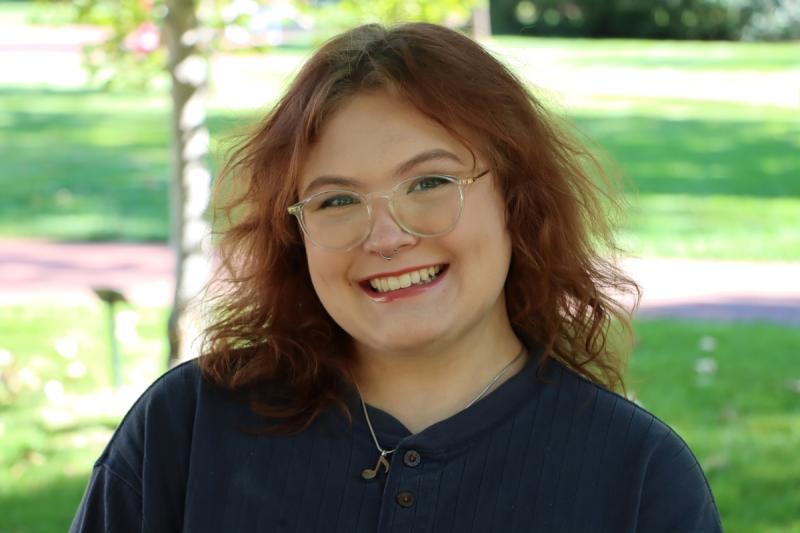CAHSS Sociology Student Turns Personal Experience into Advocacy and Action

Hannah Adams, CAHSS student majoring in sociology and triple minoring in Japanese, leadership, and socio-legal studies. Photo by Hannah Fulk.
How much does someone’s upbringing shape their aspirations? For Hannah Adams, a first-generation senior undergraduate student in the Department of Sociology & Criminology, part of the College of Arts, Humanities & Social Sciences (CAHSS), the answer is clear: her early experiences have deeply informed the person she is today and the work she hopes to do in the future.
Adams grew up in Tennessee with her younger brother and single mother, who has used a wheelchair since a car accident when Adams was four years old. When asked who her greatest influence is, Adams didn’t hesitate; her mother has been a leading force in her life for as long as she can remember.
“Seeing how people treated her and others with disabilities, I wondered how she didn’t break down every five minutes,” Adams said. “I just want to be half as strong as her.”
Early exposure to inequities related to disability has guided Adams toward research and advocacy in this area during her tenure at the University of Denver (DU). For example, her senior thesis examines sub-minimum wage laws and the legal exemptions that allow employers in certain states to pay disabled employees less than minimum wage, a policy that can make it nearly impossible for many to live comfortably.
Although such exemptions aren’t permitted in Colorado, 16 states still allow these practices. Adams believes this stems largely from perception, not ability: “A lot of what disability is, is the perception of what you can do,” she said. “It doesn’t mean disabled individuals have any less ability to do something. They just might do it differently.”
In the future, Adams’ goal is to not only propose more equitable legislation nationally but to also challenge the theoretical and physical separation between disabled and able-bodied communities in public and private spaces. “Regardless of whether you are able-bodied or not, when something is accessible, it makes everybody’s life easier,” she said.
Throughout her research, Adams has been supported by Jessica Garrick, associate professor of sociology and criminology. “She left a really strong impression on me regarding the way inequality is structured by the labor market and labor laws,” Adams said.
Adams also credits the entire sociology department for shaping her academic experience. “The sociology department at DU is the best of the best,” she said. “I would recommend any and all sociology and criminology professors to anyone interested.”
Alongside majoring in sociology, Adams is triple minoring in Japanese, leadership, and socio-legal studies. Through DU’s Japanese program, she studied abroad last spring and stayed in Japan through the summer, citing that she was amazed by the beauty of the country and was intrigued by the spirituality she experienced both by being immersed in the culture and visiting various temples and shrines.
Beyond the classroom, Adams serves as president of the Neurodivergent & Disabled Students Alliance at DU, where she and her peers advocate for accessible spaces and create a welcoming community for disabled and non-disabled students alike on campus
“Disabled people always have to worry about finding an accessible space or somewhere that’s welcoming,” Adams said. “Disability is the one type of marginalization that can affect anyone. You don’t expect to be disabled or for something to happen, so I think it’s important to be knowledgeable and to be an ally, even if you are not disabled.”
Adams is also a member of the Colorado Women’s College (CWC) leadership program, which focuses on advancing women in leadership through community, programming and training. Since her first year at DU, CWC has provided Adams with a close-knit community of peers who share her commitment to leadership and change.
Outside of her academic and advocacy work, Adams works as a marketing manager at Beans Coffee Shop on campus. While balancing work and school can be challenging, she says she thrives with a full schedule. “Having a system in place to plan out my days is very helpful,” she said. “When I’m not busy, I don’t know what to do with my time.” The flexibility of her on-campus job also allows her to work on her thesis and gain valuable management experience.
Drawing strength from her mother’s example and her own lived experiences, Adams has turned personal challenges into a powerful commitment to accessibility, equity and inclusion. After she graduates with her bachelor’s degree this spring, Adams plans to take a year off from school before attending law school, where she plans to study civil rights law.
Adams works hard as both a student and citizen to make the world a more accessible, accepting place. Through her research, leadership, and advocacy, she is contributing to the public good by building a future where disability is not a barrier, but simply another way of moving through the world.


